Best Bark Collars 2024 – Features, Types, and How to Choose for Your Dog

Choosing the best bark collar for your dog is like finding a great pair of shoes that feel just right. It's not just about stopping barking. It involves considering features that cater to your dog's needs, much like choosing shoes that complement your style.
In this guide, we'll explore why this decision is crucial, going beyond bark control to prioritizing your dog's comfort as well. Read on.
Key Factors to Consider in Finding the Best Bark Collar
When selecting a bark collar, it's crucial to consider factors such as size, breed, and collar settings. The right choice not only addresses barking but also enhances your dog's overall well-being.
Let's explore below:
1. Types of Anti Bark Collars
Bark collars come in various types, each offering unique features to address excessive barking. Understanding these types helps you choose the most suitable option for your dog.
-
Static Bark Collar
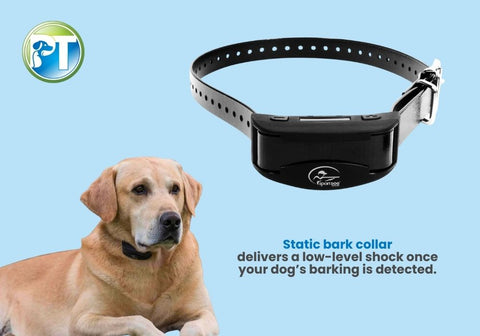
- How it works: Delivers a mild static correction when the dog barks
- Effectiveness: Highly effective for most dogs
- Suitable for: Stubborn barkers, large breeds
- Considerations: Requires careful setting adjustments, not suitable for timid dogs or breeds sensitive to shock
-
Vibration Bark Collar
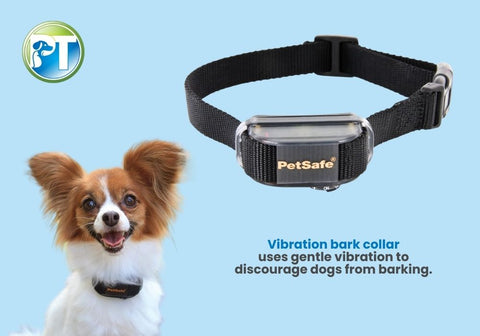
- How it works: Sends out a subtle vibration to interrupt excessive barking
- Effectiveness: Moderately effective, particularly for smaller dogs or those more sensitive to stimuli
- Suitable for: Sensitive dogs, small breeds
- Considerations: May not be effective for all dogs, some might habituate to the vibration
-
Spray Bark Collar
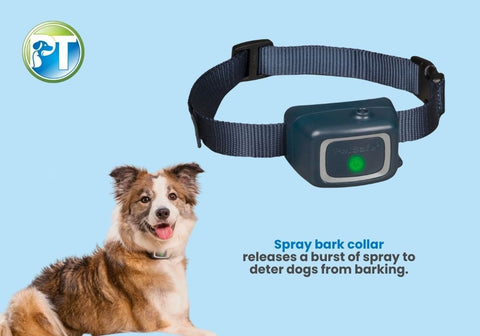
- How it works: Releases a small puff of citronella or unscented spray whenever the dog barks
- Effectiveness: Moderately effective, some dogs dislike the smell, but others may adapt
- Suitable for: Playful dogs, sensitive breeds
- Considerations: Requires refilling the spray, not suitable for cold weather as the spray may freeze
-
Ultrasonic Bark Collar
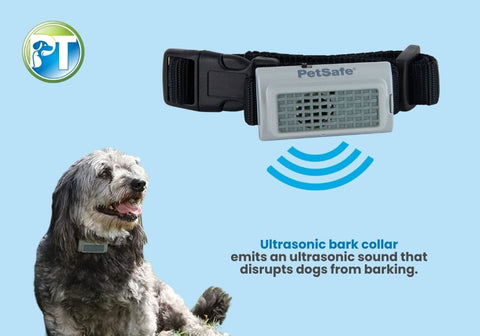
- How it works: Emits high-pitched sounds inaudible to humans but unpleasant to dogs
- Effectiveness: Varies depending on the dog, some are sensitive while others ignore it
- Suitable for: Easily distracted breeds
- Considerations: May not be effective for all dogs, especially those with hearing issues
Some dog bark collars offer a combination of vibration, tone, and/or shock, allowing you to choose the most effective option for your dog. For example, you might start with vibration for gentle correction and escalate to a mild shock only if necessary.
2. Dog's Size and Breed
Choosing the right bark collar for your dog significantly depends on their size and breed. Here's a breakdown of different approaches and their suitability:
-
Size
- Small (<20 lbs): Opt for lightweight collars with adjustable straps. Vibration or ultrasonic collars with adjustable intensity are good options. Spray collars may also be suitable, but choose one with a mild scent.
- Medium (20-50 lbs): Vibration, ultrasonic, or even mild static shock collars can be suitable, depending on your dog's sensitivity. The bark collar receiver size should match their neck size without being heavy.
- Large (>50 lbs): Larger dogs typically tolerate stronger stimuli. Static bark collars can be effective for stubborn and persistent barkers. However, always prioritize humane settings and start with lower intensities.

Remember, size isn't the only factor; some large breeds might still be sensitive.
- Breed and Temperament
- Highly sensitive breeds: These dog breeds (e.g., Shih Tzu, Golden Retriever) may respond well to gentler options like vibration or ultrasonic collars.
- Playful and easily distracted breeds: These breeds (e.g., Border Collie, Cavalier King Charles Spaniel) may be effectively deterred by ultrasonic collars or citronella bark collars.
- Stubborn dog breeds: These breeds (e.g., Siberian Husky, Rottweiler) may require a more persistent deterrent. Consider shock collars with adjustable settings and prioritize training alongside it. Remember, even stubborn dogs deserve humane treatment.
- Brachycephalic breeds: Breeds with short snouts (e.g., Pug, Bulldog) may have breathing difficulties. Avoid spray collars that could trigger respiratory issues and prioritize alternative methods.

NOTE: Individual dogs within a breed can vary greatly. Always observe your dog's specific reactions and sensitivities to choose the most suitable bark control device.
3. Bark Collar Features and Customization
Choosing the ideal bark collar requires tailoring your decision to suit your dog's specific needs. This is where features and customization come in:
-
Bark Detection Technology
Accuracy is key. Look for collars with advanced bark detection technology to minimize false triggers. Excellent no bark collars focus on your dog's specific vocalizations, filtering out surrounding noise like sirens or other dogs barking in the distance. This helps ensure the collar only responds to your dog's actual barks.
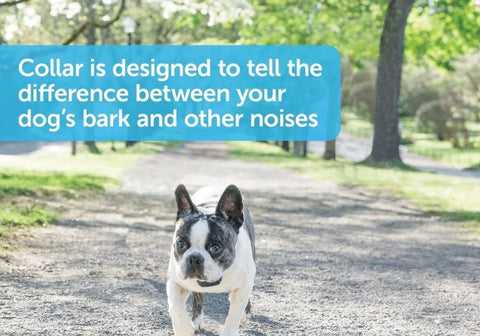
-
Stimulation Intensity
A bark collar with multiple stimulation levels allows you to personalize the correction to your dog's sensitivity and temperament. While some dog bark collars offer fixed intensities, others provide adjustable settings allowing you to start low and gradually increase if needed.
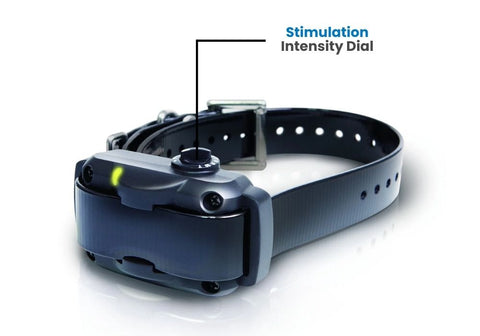
-
Training Modes
Typically found in static bark collars, some offer various training modes:
- Automatic: This mode adapts the correction intensity based on your dog's barking, adjusting the level in response to louder or more persistent barking.
- Manual: In this mode, you can select the correction level, giving you direct control over the training experience.
- Progressive: This mode gradually increases correction intensity with successive barks, encouraging your dog to stop after the initial mild prompt.
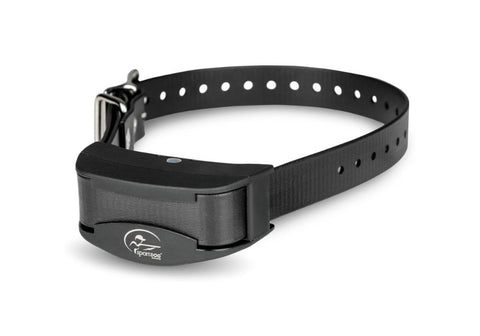
For a more detailed guide on bark collars, check out our blog here.
Top Bark Collars Based on Specific Dog Needs
Explore our recommended bark collars tailored to specific dog needs:
1. Best Bark Collars for Small Dogs
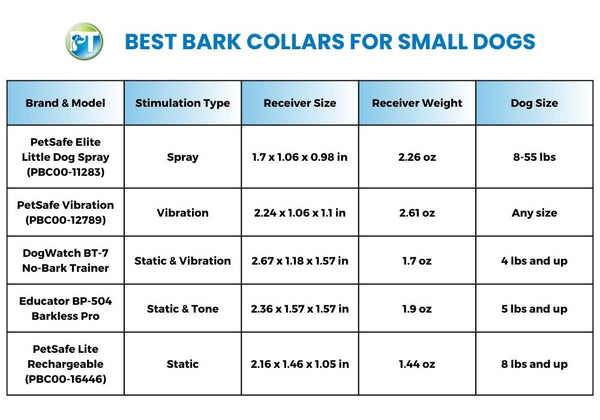
- PBC00-11283 PetSafe Elite Little Dog Spray Bark Collar
- PBC00-12789 PetSafe Vibration Bark Control Collar
- Dogwatch BT-7 No-Bark Trainer
- Educator BP-504 Barkless Pro Anti-Bark Collar
- PBC00-16446 PetSafe Lite Rechargeable Bark Collar
2. Best Bark Collars for Large Dogs
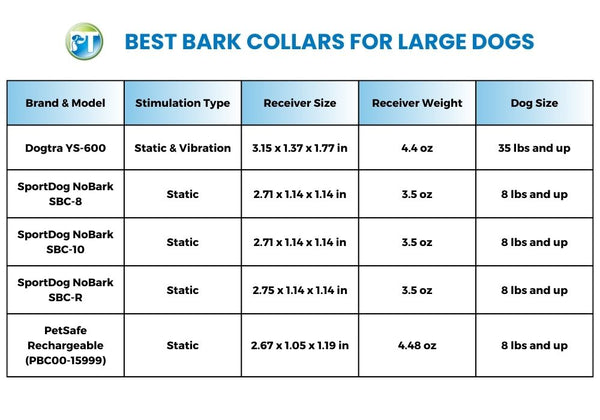
- Dogtra YS600 No Bark Collar
- SportDog NoBark SBC-8 No Bark Collar
- SportDog Brand NoBark SBC-10 No Bark Collar
- SportDog NoBark SBC-R No Bark Collar
- PBC00-15999 PetSafe Rechargeable Bark Control Collar
3. Best Bark Collars for Timid or Sensitive Dogs
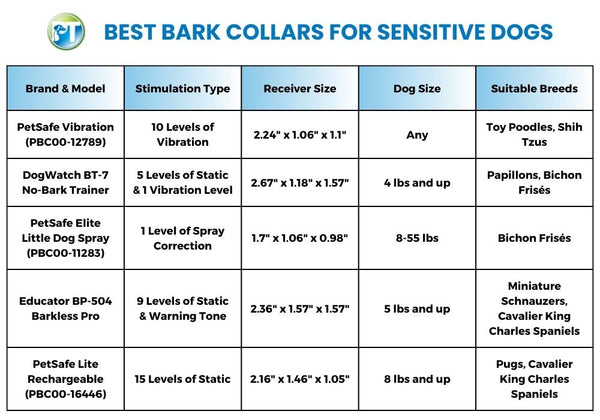
- PBC00-12789 PetSafe Vibration Bark Control Collar
- Dogwatch BT-7 No-Bark Trainer
- PBC00-11283 PetSafe Elite Little Dog Spray Bark Collar
- Educator BP-504 Barkless Pro Anti-Bark Collar
- PBC00-16446 PetSafe Lite Rechargeable Bark Collar
4. Best Bark Collars for Strong-Willed or Stubborn Dogs
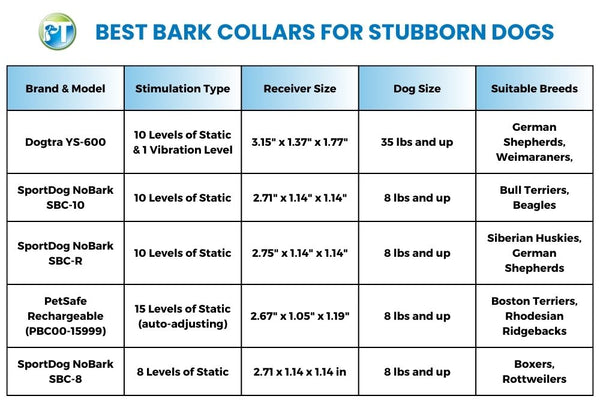
- Dogtra YS600 No Bark Collar
- SportDog Brand NoBark SBC-10 No Bark Collar
- SportDog NoBark SBC-R No Bark Collar
- PBC00-15999 PetSafe Rechargeable Bark Control Collar
- SportDog NoBark SBC-8 No Bark Collar
Conclusion
Bark collars are communication devices, helping your furry friend understand what "no barking" means. But remember, the real goal is a happy, well-behaved pup, not just a quiet one.
By considering your dog's size, breed, and temperament, you can choose a bark collar that is both effective and safe. However, if you're still feeling unsure, don't hesitate to ask a dog trainer for assistance.
Frequently Asked Questions
-
Do bark collars really work?
Yes, bark collars can be effective in curbing excessive barking. Their success, however, hinges on factors such as selecting the right collar for your dog and proper training.
-
How does a bark collar work?
A bark collar is a device designed to discourage excessive barking in dogs by providing a correction when barking is detected. The best collar depends on your dog's size, breed, and sensitivity, so choose one that fits well and ensures their comfort.
-
Can you use a bark collar on a puppy?
It's generally not recommended to use a bark collar on a puppy, as their behavior is often part of normal development. It's advisable to wait until the puppy reaches at least 6 months old before considering using a bark collar.
You might also enjoy...
-
Posted in
Dog Training, E-Collar Info & Guides, Training Tips


